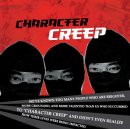From time to time, I want to feature some emerging young voices that need to be heard. Today’s emerging voice is Vince Campbell. I first met Vince when he was an undergrad at Wheaton College. I invited him and his wife, Diana Mojica (another important emerging voice) to come to Boston to intern at CCFC while attending Gordon-Conwell. Vince and Diana finished up at GCTS, then Vince completed his ThM at Princeton and is now beginning PhD studies in early church history (with a focus on the early African church) at Catholic University. You will be hearing from Vince in the years to come. I thought it’d be good to introduce him to you here.
Christianity’s African Roots by Vince Campbell
While the contemporary re-centering of Christianity from the Global North to the Asian, African, and South American continents has garnered the attention of many a missiologist, witnesses to the multi-cultural Kingdom of God as revealed in Jesus Christ must remember that Christianity’s presence in black and brown nations is anything but a modern phenomenon. Ancient communities of Jesus-followers in India, China, the Middle East, and Africa stretching back to the time of the apostles tell the story of a global Christian faith free of Western cultural captivity. If we take an African theologian, preacher, and monk of the fifth century named Shenoute as a starting point, we see that not only was Christianity an indigenously African religion in its beginning stages but that it was used as a social mechanism to construct Egyptian identity in conjunction with belief in Jesus over against a pagan Western (Greek) religious and cultural hegemony.
Father Shenoute was an Egyptian monk who, during his 118 year life led a monastic community of some 2,200 monks and 1,800 nuns in the Upper Nile Valley area of Sohag. His aggressive literary campaign filled with theological treatises and sermons found in the library of his monastery is unparalleled in fifth-century Coptic Egypt. Shenoute’s writings (as well as his personality) were renowned for their empowerment of the poor, defense of orthodoxy, and attack on heresy and paganism. While these themes were not uncommon among monks in the early church, the Egyptian contextualization of the Gospel in response to oppressive Western pagan influences are a feature unique to Shenoute. In the case of his sermon entitled “Not Because the Fox Barks,” he encourages his African peasant congregation while rebuking the oppression of a local wealthy landlord. Shenoute identifies this landlord, Gesios’ oppressions as forcing the poor African Christians to perform ritual baths (an ancient Greek pagan ritual) while hindering them from celebrating the Pascha (Easter). Shenoute encourages his African congregation by claiming that “Not because the fox barks- which is you servant of Mammon- should the lion be afraid- which is the servant of Christ.”
While the Roman Empire of the fifth century was predominately a safer place for Christians due to the acceptance of Christianity as a state religion, this didn’t change the reality of the majority of land-owning aristocrats in Upper Egypt being predominately pagan and hostile to Christianity. However, in his defense of the poor against Western pagan oppression, Shenoute points to the growing reality that the Christians are growing fast in number and retain a power greater than that of the wealthy who put their faith in pagan gods. The Coptic Christians of Egypt worshipped Jesus while resisting the cultural, economic, and political subjugation of the Western world which, was still predominately pagan. Similar stories that take place in Nubia, Ethiopia, Carthage, Syria, and other nations prove powerful examples of Christianity’s deep roots among people of color and dispel the myth that Christianity is or ever has been a Western religion.
For further reading:
Ehrman, Bart D. Lost Christianities: The Battles for Scripture and the Faiths we Never
Knew. Oxford University Press. 2003.
Emmel, Stephen. “From the Other Side of the Nile: Shenoute and Panopolis” in A.
Egberts, B.P. Muhs, and J. van der Vliet. Perspectives on Panopolis: An Egyptian
Town from Alexander the Great to the Arab Conquest. Leiden: Brill. 2002.
Frankfurter, David. Religion in Roman Egypt: Assimilation and Resistance. Princeton,
NJ: Princeton University Press. 1998.
Keener, Craig & Usry, Glenn. Black Man’s Religion: Can Christianity be Afrocentric?
Downers Grove, IL: InterVarsity Press. 1996.
Goehring, James E. & Pearson, Birger A. The Roots of Egyptian Christianity.
Philadelphia, PA: Fortress Press. 1986.
Meinardus, Otto F.A. Two Thousand Years of Coptic Christianity. Cairo, Egypt: The
American University in Cairo Press. 1999.
Schroeder, Caroline T. Monastic Bodies: Discipline and Salvation in Shenoute of Atripe.
Philadelphia, PA: University of Pennsylvania Press. 2007.








